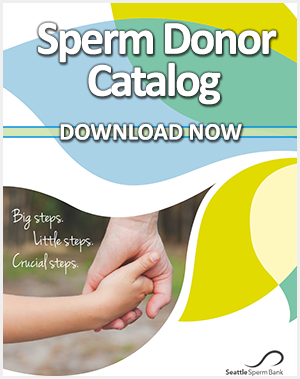
Two recent headlines about sperm donor age and fertility outcomes have made waves in the reproductive health space. According to a Daily Mail article, new research presented at the European Society of Human Reproduction and Embryology (ESHRE) 2025 meeting found that sperm from men over 45 was linked to higher miscarriage rates, even when paired with donor eggs from young women.
Meanwhile, STAT News cited the same research, emphasizing that while female age remains the most prominent factor in IVF success, male age can’t be overlooked either.
At Seattle Sperm Bank (SSB), we appreciate the increased attention on male fertility, and we want to provide a transparent, science-informed response.
While these stories may raise concerns, they also underscore the importance of strict donor screening protocols that SSB has implemented from the outset.
Does Age Matter in Sperm Donation?
The short answer? Yes, but with important caveats.
The study presented at ESHRE reviewed outcomes from over 4,000 IVF cycles using donor eggs and found that miscarriage rates were almost 50% higher when sperm came from men over 45. Even though embryo implantation rates weren’t affected, live birth rates declined.
The takeaway?
Male age, much like female age, can have subtle yet meaningful effects on fertility outcomes, particularly in assisted reproductive technologies like IVF.
This aligns with previous research showing that sperm from older men may be more likely to carry DNA fragmentation or de novo mutations linked to age, which can impact embryo development or contribute to miscarriage.
However, it’s worth noting that this doesn’t mean older men can’t father healthy children; it does, however, point to the importance of careful screening and limits in donor programs.
Seattle Sperm Bank’s Approach: Age Limits With Intention
At Seattle Sperm Bank, we’ve always taken the science seriously. That’s why we require all of our sperm donors to be between 18 and 40 years old, a standard that aligns with both best practices and emerging research.
Here’s what sets Seattle Sperm Bank’s process apart:
- Age Restrictions: All donors must be 40 or younger, ensuring they fall within the age window associated with optimal sperm quality and lower genetic risk.
- Health & Lifestyle Criteria: Donors must be in generally good health and able to donate regularly for at least six months.
- Education Requirements: Donors must either hold a college degree or be currently enrolled in a college program.
- Semen Analysis: Every potential donor undergoes a semen analysis and a thaw test to confirm that their sperm meet our high standards for motility, morphology, and count (according to the WHO semen analysis guidelines).
- Comprehensive Genetic Screening: Donors complete a four-generation family history review and undergo carrier screening for common heritable conditions.
- Infectious Disease Testing: Screening includes testing for HIV, Hepatitis B & C, CMV, and other FDA-mandated infectious diseases.
- Ongoing Monitoring: Donors receive physical exams every six months, undergo regular STI testing, and complete a criminal background check.
- Open ID Commitment: Our Open ID program empowers donor-conceived individuals to connect with their donor at age 18, fostering transparency and accountability.
Our goal is not just to provide sperm but to support healthy families and informed choices. That begins with selecting donors whose age, health, and genetics meet the highest standards in reproductive medicine.
Understanding the U.S. Landscape: Regulation vs. Responsibility
Unlike some countries, the United States does not have strict federal laws regarding donor age limits. The FDA primarily focuses on infectious disease screening and donor eligibility for HCT/P (Human Cells, Tissues, and Cellular and Tissue-Based Products).
The American Society for Reproductive Medicine (ASRM) suggests limiting conceptions to 25 births per 800,000 population from a single donor to minimize consanguinity risks. However, these guidelines are not legally binding rules.
This is why it’s critical to choose a sperm bank that operates above the regulatory minimums. At SSB, we see regulation as the floor, not the ceiling. Our practices are rooted in medical ethics, reproductive science, and a deep respect for our donor-conceived families.
A Word on DIY Sperm Donation
While it may be tempting to bypass sperm banks and source donors through online ads or private arrangements, this approach carries risks. Without age restrictions, medical screening, legal protections, or genetic testing, individuals may be exposed to:
- Higher likelihood of using sperm with undetected genetic conditions.
- Legal ambiguity about parental rights and responsibilities.
- Increased chance of unregulated donor conception leading to consanguinity.
Why This Matters for Recipients
Whether you’re a single parent by choice, a same-sex couple, or part of a couple facing male infertility, choosing the right donor is one of the most important decisions you’ll make. By working with Seattle Sperm Bank, you gain peace of mind that:
- Your donor is within a safe, evidence-backed age range.
- The sperm has been rigorously tested and screened.
- You have access to detailed medical histories, photos, and more.
- Your family-building journey is backed by transparency, science, and care.
We also offer consultations with our team, including genetic counselors and client services staff, to ensure that you feel informed and supported throughout the process.
The Bottom Line: Age is One Factor, Not the Whole Story
Yes, age matters, but so do many other factors. Donor selection is about quality, integrity, and data-informed practices. At Seattle Sperm Bank, we take every factor into account to help you build the family you’ve been dreaming of with confidence.
If you have questions about donor age, sperm quality, or how to start your journey, our team is here to help. Reach out to us anytime or explore our Donor Catalog to learn more about our services.
Because when it comes to building families, we believe in science, safety, and prioritizing people.

